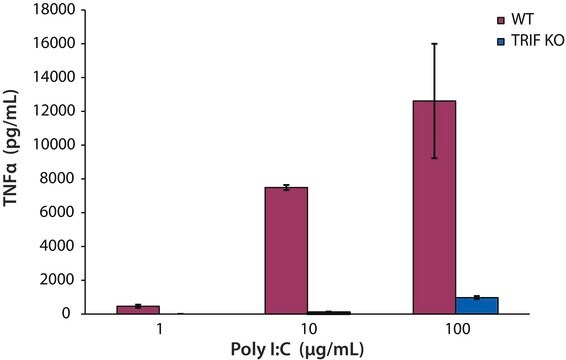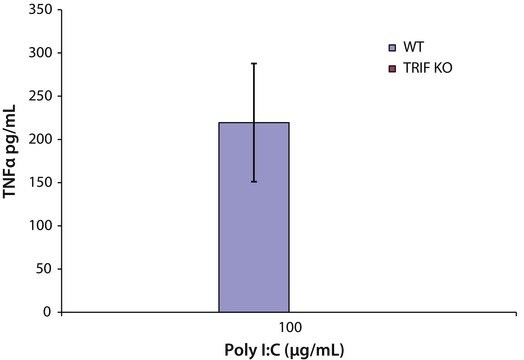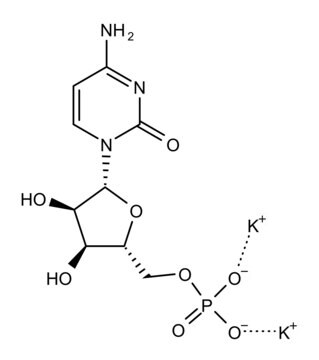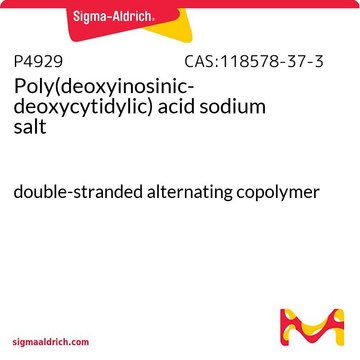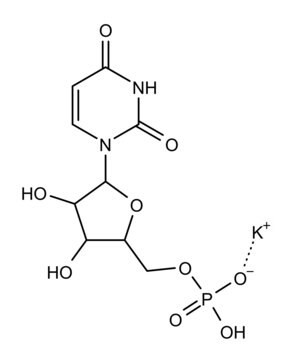P0913
Polyinosinic–polycytidylic acid sodium salt
γ-irradiated
Synonym(s):
Poly (I:C), Poly(I) • Poly(C)
Sign Into View Organizational & Contract Pricing
All Photos(1)
About This Item
Recommended Products
biological source
synthetic (organic)
Quality Level
sterility
γ-irradiated
Assay
≥99% (less than 1% free nucleotides, TLC)
form
lyophilized powder
storage condition
desiccated
solubility
H2O: 10 mg/mL
storage temp.
−20°C
Looking for similar products? Visit Product Comparison Guide
Application
TLR3 recognizes double-stranded RNA and is a major effector of the immune response against viral pathogens. Polyinosinic–polycytidylic acid (Poly(I) • Poly(C)) is a double-stranded homopolymer used as a model RNA to study cell signaling at the level of TLR3. Poly(IC) is a TRIF-dependent toll-like receptor-3 (TLR3) ligand.
Biochem/physiol Actions
Transfection of Poly (I:C) into NIT-1 cells has been used as a model of intracellular dsRNA-induced β cell apoptosis. Eighteen hours post transfection, 45% of the cells were apoptotic with an increase in NF-kB, p50/p65 nuclear translocation, and cleavage of caspases 3 and 8, as well as transcriptional induction of caspase 12, Fas, IL-15, and the TNF receptor-associated ligand (TRAIL). It has been suggested that Poly(I:C) is one of the most appropriate generators of stable mature dendritic cells (DC). These mature DC might generate in vivo effective immune responses after injection due to their ability to secrete bioactive IL-12 after CD40 ligation. Poly (I:C) was used as a potent adjuvant to enhance the specific anti-tumor immune responses against a peptide-based vaccine.
Other Notes
Double-stranded homopolymer.
Preparation Note
The product requires ionic strength to maintain the double-strand structure. To prevent denaturation, reconstitute in solutions with physiological salt concentrations (e.g., saline solution). Reconstitution may require heating (50 °C) and cooling to achieve re-annealing.
Storage Class Code
11 - Combustible Solids
WGK
WGK 3
Flash Point(F)
Not applicable
Flash Point(C)
Not applicable
Personal Protective Equipment
dust mask type N95 (US), Eyeshields, Gloves
Certificates of Analysis (COA)
Search for Certificates of Analysis (COA) by entering the products Lot/Batch Number. Lot and Batch Numbers can be found on a product’s label following the words ‘Lot’ or ‘Batch’.
Already Own This Product?
Find documentation for the products that you have recently purchased in the Document Library.
Customers Also Viewed
Joao N Duarte et al.
Journal of immunology (Baltimore, Md. : 1950), 197(12), 4838-4847 (2016-11-09)
mAbs specific for surface proteins on APCs can serve as Ag-delivery vehicles that enhance immunogenicity. The practical use of such constructs is limited by the challenge of expressing and modifying full-sized mAbs. We generated single-domain Ab fragments (VHHs) specific for
Xi Xue et al.
Cells, 8(12) (2019-12-11)
MicroRNAs (miRNAs) are key regulators in fish immune responses. However, no study has previously characterized the impact of polyriboinosinic polyribocytidylic acid (pIC) and formalin-killed typical Aeromonas salmonicida (ASAL) on miRNA expression in Atlantic salmon fed a commercial diet with and
Dan-Dan Tu et al.
Fish & shellfish immunology, 69, 119-127 (2017-07-27)
Peroxiredoxin 5 (Prx5) belongs to a novel family of evolutionarily conserved antioxidant proteins that protect cells against various oxidative stresses. Generally, no more than one Prx5 transcript had been reported in non-primate species. In this study, two Prx5 genes (coined
Dagoberto Sepúlveda et al.
Fish & shellfish immunology, 85, 99-105 (2018-07-04)
The highly effective DNA vaccines against diseases caused by fish rhabdoviruses in farmed fish consist of a DNA plasmid vector encoding the viral glycoprotein under the control of a constitutive cytomegalovirus promoter (CMV). Among others, attempts to improve efficacy and
Satoshi Nakamura et al.
Journal of bone and mineral metabolism, 37(4), 627-635 (2018-10-17)
Insulin-like growth factor-I (IGF-I) is a peptide with diverse functions, among them regulation of embryonic development and bone homeostasis. Serum IGF-I levels decline in the elderly; however, IGF-I function in adults has not been clearly defined. Here, we show that IGF-I is
Our team of scientists has experience in all areas of research including Life Science, Material Science, Chemical Synthesis, Chromatography, Analytical and many others.
Contact Technical Service